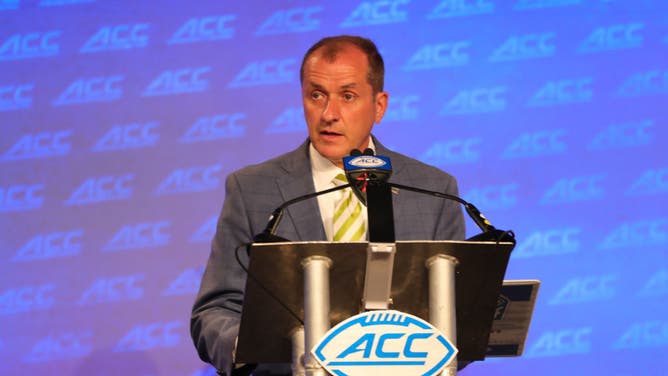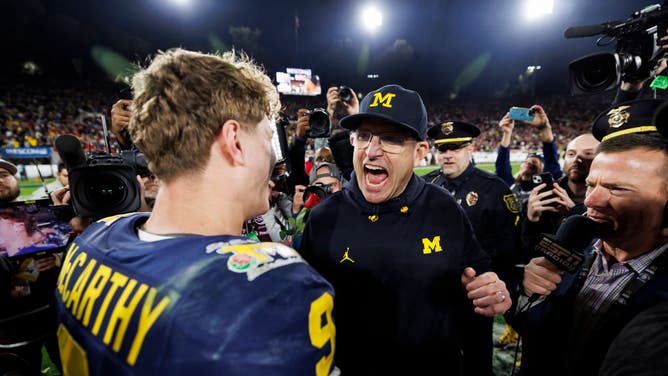ACC's Jim Phillips Calls Florida State, Clemson Lawsuit 'Disruptive And Harmful', Leaders Are NCAA Focused
While the conversations between members of the ACC conference have been cordial this week at their annual spring meetings, commissioner Jim Phillips described the ongoing lawsuits with Florida State and Clemson as ‘disruptive and harmful’.
Guess what? He's not wrong, but this is the current hand that's been dealt to a conference that is dealing with a lack of respect when it comes to perception of the league's football product. Those aren't my words. The reaction came from Florida State athletic director Michael Alford on Tuesday when discussing how his football team was left out of the playoffs last season.
"We've got to keep marketing ourselves," Alford told Warchant. "We've got to get better. What happened last year was tragic, and it spoke volumes of the perception, i believe, of this league when it comes to football specifically."
The reality is that the past is certainly dictating the future, and the situation surrounding Florida State toward the end of the 2023 football season only stoked the fire further. We had already seen the Seminoles board of trustees go nuclear on the conference during several meetings that led to the lawsuit being filed against the ACC in a Florida court, which then led to the ACC filing suit against the Seminoles in a back and forth battle between lawyers.

And while the conversations around Florida State and Clemson were cordial this week at spring meetings, it's not as if the ongoing case involving both schools wasn't a topic of conversation in the hotel lobby or restaurants. You have to remember, these athletic directors are all still working together for the betterment of the conference, even if two schools are suing to get out of a media rights deal.
But the stark reminder of what is currently transpiring within the ACC was discussed on Wednesday morning by commissioner Jim Phillips, as he was asked about the current situation with both the Seminoles and Tigers.
"It's difficult, it's disruptive, it's harmful, but that's the world we live in and they have the ability to do the things that they're doing," Phillips told a group of reporters.
Perception Is Reality For The ACC In Current Television Market
While the SEC and Big Ten are about to cash-in on a very lucrative television deal with their respective networks, the ACC is stuck in third place with a deal with ESPN. Even outside of the television contract, the latest College Football Playoff deal that was agreed to has the ACC at a major disadvantage, with the SEC and Big Ten raking in more than $20 million per season, and the ACC will receive around $12-$13 million per year.

: Quarterback J.J. McCarthy #9 celebrates with head coach Jim Harbaugh of the Michigan Wolverines after the CFP Semifinal Rose Bowl Game. . (Photo by Ryan Kang/Getty Images)
We're not even discussing the annual television deal that has the ACC making around $30 million per year for every school. So, when conference officials look at the Big Ten signing a seven-year deal worth $8 billion and the SEC signing a $3 billion deal with ESPN, there's a reason why ACC leaders are upset about the disparity.
"We remain and deliver the third highest gross-revenue distribution among all conferences," ACC commissioner Jim Phillips told reporters about its TV deal. "That's important. It just is. We're not staying still. We're still trying to address that gap."
OK, I'm sure that Florida State is happy that the conference is not standing still, but there's no way the ACC will make that type of money with its current group of teams, and they know it. So the lip-service is well intended, but it doesn't go very far when you just look at the numbers.
The Pending Separation Still Seems Likely, Even With ACC Comments
There's no way to get around this one, especially if you're taking this to court. The impending separation between the ACC, FSU and Clemson will end up happening at the end of the day. While lawyers are using their skills to make sure the billable hours are high enough to drag this on, (lawyers are going to make their money) the future is still heading towards a split.
Asked if the relationships between the ACC and both schools could still be salvaged, commissioner Jim Phillips toed the company line when it came to discussing the future.
"You always stay optimistic and work through these things", Phillips said to reporters. "I don't know where it's going to go. But I continue to remain optimistic. Am I going to fight and protect the ACC? Absolutely."
It surely didn't help when the North Carolina board of trustees came out this week and said that the athletic department needed to be audited. Upset over a potential $17 million deficit for the upcoming academic year, board members decided to throw a hand-grenade into the ACC meetings, from Chapel Hill, while at the same time putting athletic director Bubba Cunningham on notice.
"Carolina's ability to maintain excellence at a high level is going to require really prudent budgeting and revenue models and potential cost-cutting," UNC trustee Dave Boliek told reporters following the meeting. "A lot of it is due to the revenue or lack there of revenue that we're not receiving from the ACC deal."
Yep, that was a direct shot at the ACC and lack of funds coming from the conference on a yearly basis with its media and rights contract. While Florida State and Clemson are suing the ACC, it sounded as if the North Carolina board of trustees were ready to join the two in their attempt to exit the conference.
Now, this is obviously a ways to go, but North Carolina might be the most intriguing prospect for either the SEC or Big Ten with future expansion, again. If you wanted to hear a subtle hint at where this could possibly go in the future, trustee Dave Boliek is starting to sound a lot like the Florida State trustees from their explosive Zoom meetings last year, when discussing a move out of the ACC, and into a bigger conference.
"That's what we need to do. We need to do everything we can to get there. Or the alternative is the ACC is going to have to reconstruct itself. I think all options are on the table."
All the while, a looming vote from college leaders regarding the settlement of lawsuits against the NCAA will change the landscape of collegiate sports.
What's Next For The ACC? Voting On Settling NCAA Lawsuits
The next order of business for ACC presidents will be to vote on whether to accept the pending settlement regarding the House vs. NCAA lawsuit that will lead to revenue sharing in collegiate sports. All that is needed is a simple majority in-favor of agreement that will see the NCAA settling for around $2.7 Billion that will take care of the damages associated with backpay owed to athletes for NIL compensation that would've occurred before 2021.
The NCAA does not want this to go to court, and have a ruling not go in their favor, which would cost them nearly $20 billion according to Yahoo Sports. There's no reason to take that risk, so the easy, but costly, way to handle this is settling.
The settlement would also come with a number of different add-ons, including a revenue-sharing model for athletic departments around the country. The revenue cap, much like in the NFL, could range anywhere from $15 to $20 million in the first year, which teams have the choice to use. How that would be paid out to student-athletes is still up for discussion, with players having the ability to opt-in as well.
One of the bigger issues that will come from this settlement is how this will be handled when it comes to Title IX, and will schools be given a cap on scholarships, or how they can spend the money on different sports.
While there are a number of questions that remain, college football leaders are ready to get the first part settled, which will then lead to conversations on what this new era of college athletics will look like, along with how it's managed.
The landscape of collegiate sports is about to change, with voting expected to occur over the next week in conferences across the country. ACC presidents are scheduled to meet next week, while SEC presidents met in Birmingham on Wednesday to discuss the upcoming vote on the NCAA settling its case.
The next order of business will come next week, when the Big Ten meets in Los Angeles for its spring meetings, with the SEC scheduled for their annual retreat in Destin, Florida at the end of the month.
A lot will happen over the next ten days, or even sooner.